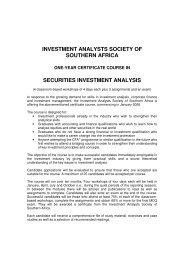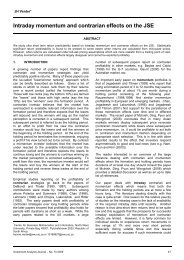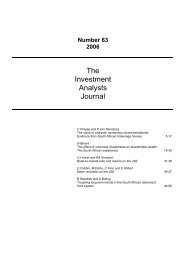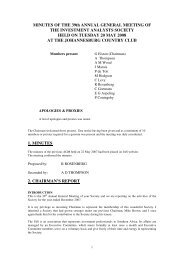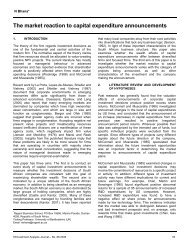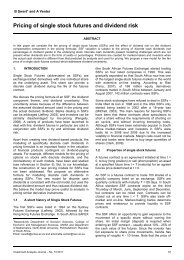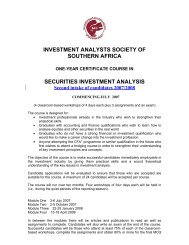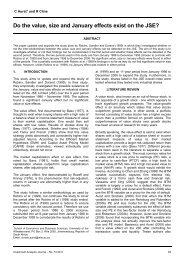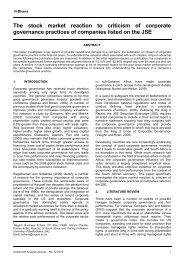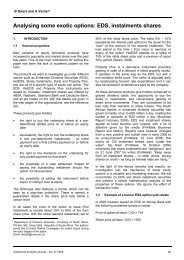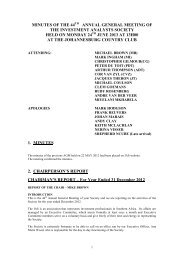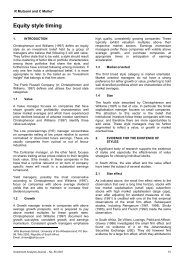Accounting is Broken - Investment Analysts Journal
Accounting is Broken - Investment Analysts Journal
Accounting is Broken - Investment Analysts Journal
Create successful ePaper yourself
Turn your PDF publications into a flip-book with our unique Google optimized e-Paper software.
Stern Stewart & Co.<br />
E n ron poses a classic<br />
example of the hazard s<br />
of mixing operating and<br />
financing dec<strong>is</strong>ions.<br />
Debt for them <strong>is</strong> like a<br />
drink of wh<strong>is</strong>key. It’s<br />
too good to stop once<br />
they really get going.<br />
A corporate dec<strong>is</strong>ionmaking<br />
rule has been<br />
developed to d<strong>is</strong>courage<br />
managers from making<br />
those m<strong>is</strong>takes, m<strong>is</strong>allocating<br />
capital, and r<strong>is</strong>king<br />
financial d<strong>is</strong>tress. It<br />
<strong>is</strong> to stop managers fro m<br />
taking the first drink by<br />
f o rcing them to separate<br />
financing sources fro m<br />
investment uses.<br />
By their failure to align<br />
accounting principles to<br />
economic value, accountants<br />
are forcing managers<br />
to live uncomfortably<br />
in two worlds–one,<br />
the internal world in<br />
which re s o u rces are<br />
allocated according to<br />
the separation rule, and<br />
the second, the bookkeeping<br />
world in which<br />
the choice of debt or<br />
equity financing does<br />
a ffect the re p o rt e d<br />
results.<br />
Because of that d<strong>is</strong>parity, managers face temptations to grossly m<strong>is</strong>allocate capital. They<br />
may take on weak projects that they can dress up with attractive debt financing, and pull<br />
back from worthwhile projects if they no longer can tap debt sources and must ra<strong>is</strong>e expensive<br />
new equity. What’s worse, managers can become so enamored with the financial<br />
attractions of debt that they leverage up to the brink of financial ruin, if not over it.<br />
Enron poses a classic example of the hazards of mixing operating and financing dec<strong>is</strong>ions.<br />
Management announced in the 2001 annual report, “we are laser-focused on earnings-pershare,”<br />
and so they were. Enron executives were so preoccupied with giving their EPS and<br />
ROE a ride that they began to use debt very aggressively to fund such questionable projects<br />
as overseas water utilities and broadband telecom networks. Even as leverage climbed<br />
to dizzying heights, the firm’s top brass could not bring themselves to tap the equity markets<br />
to relieve the financial stress. Eventually the slightest puff of breeze was sufficient to<br />
knock down the house of cards that Ken Lay built.<br />
Once a company runs down the path of leveraging its growth, it <strong>is</strong> difficult for it to reverse<br />
course. Confronted with a much stiffer cost of equity (or fearing the consequences of diluting<br />
EPS or ROE), managers become reluctant to ra<strong>is</strong>e equity to finance even sound projects.<br />
Like addicts, they keep borrowing from the future and hoping for the best today.<br />
Debt for them <strong>is</strong> like a drink of wh<strong>is</strong>key. It’s too good to stop once they really get going.<br />
Just ask Enron CFO Andrew Fastow.<br />
A corporate dec<strong>is</strong>ion-making rule has been developed to d<strong>is</strong>courage managers from making<br />
those m<strong>is</strong>takes, m<strong>is</strong>allocating capital, and r<strong>is</strong>king financial d<strong>is</strong>tress. It <strong>is</strong> to stop managers<br />
from taking the first drink by forcing them to separate financing sources from investment<br />
uses. According to th<strong>is</strong> longstanding capital budgeting procedure, management <strong>is</strong><br />
required to evaluate potential investment projects on their own merits rather than penalizing<br />
or subsidizing them according to how each <strong>is</strong> financed. All of a company’s costs of capital<br />
are to be combined into one overall blended cost, and that weighted average cost of<br />
capital, or WACC as it <strong>is</strong> known in financial circles, <strong>is</strong> to be used as the hurdle rate for judging<br />
all projects regardless of how the individual projects are actually financed. The rule<br />
implies that the actual debt or equity a company employs <strong>is</strong> m<strong>is</strong>leading, transitory and irrelevant.<br />
What matters <strong>is</strong> whether a project would look good assuming that it was financed<br />
with a prudent and sustainable blend of debt and equity.<br />
Most companies nowadays do correctly separate operating and financing dec<strong>is</strong>ions<br />
when they initially consider capital spending and acqu<strong>is</strong>ition proposals. They do use an<br />
overall WACC to measure the value of investment projects and as a key input to decide<br />
which ones to accept or reject. The problem <strong>is</strong>, that <strong>is</strong> not the only input into how they<br />
d e c i d e .<br />
Many top executives also feel they must keep an eye on how new investments will affect<br />
their overall ROE and EPS results, measures that unfortunately do not separate operating<br />
and financing dec<strong>is</strong>ions. By their failure to align accounting principles to economic value,<br />
accountants are forcing managers to live uncomfortably in two worlds–one, the internal<br />
world in which resources are allocated according to the separation rule, and the second, the<br />
bookkeeping world in which the choice of debt or equity financing does affect the reported<br />
results. Schizophrenic managers try to bridge both worlds, balancing the two perspectives.<br />
They invariably trade off a m<strong>is</strong>allocation of capital (and an intrinsically lower market<br />
value) for a more attractive seeming financial report. They should not be forced into<br />
making such unrewarding comprom<strong>is</strong>es.<br />
6



